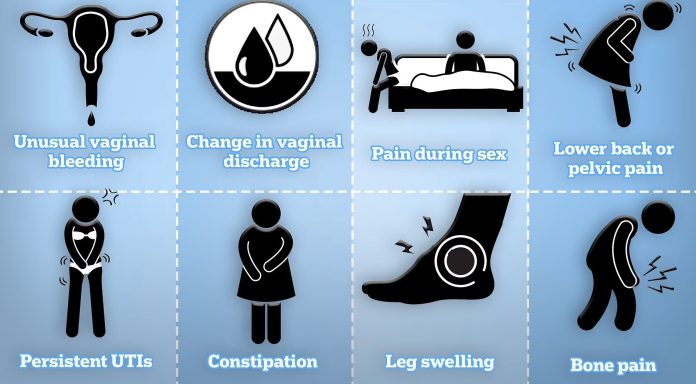Women are encouraged to look out for the most common signs of cervical cancer. This is because cervical cancer is the 14th most common cancer, with around 3,200 new cases every year, while one in 142 females will be diagnosed within their lifetime.
Experts say while cervical cancer can often be without symptoms, there are some signs you should never ignore.
From painful sex to fatigue and unexplained weight loss, read on to find out more about the potential signs of cervical cancer and how spotting them early could save your life.
READ ALSO: My kids are grown now, but it was hard raising them as single mum
Women could be ignoring some potential key symptoms of cervical cancer, due to a lack of awareness about what to look out for, a leading health expert has warned.

Researchers at Cancer Research UK lament that too few women are aware of the signs of cervical cancer, and many women simply ignore to take up the offer of free cervical screening!
Valentina Milanova, founder of women’s health research and development company, Daye, says since cervical cancer can often be symptomless, it is so important to attend regular cervical screenings so your doctor can check for any pre-cancerous cells.
Also, there are some symptoms you should never ignore.
“One of the most difficult things about cervical cancer is that in its early stages, it often doesn’t present any symptoms,” explains Milanova. “It’s not until it is in its advanced stages that symptoms start to show. This is why it’s incredibly important that all women attend their regular cervical screenings (also known as smear tests).
“Cervical screening is a way of preventing cervical cancer, as it tests for HPV, which causes the majority of cases of cervical cancer.
“If detected early, cervical cancer is one of the most successfully treatable cancers. If you or someone you know are experiencing any of the following symptoms, make an appointment with your doctor.”
From unexpected vaginal bleeding to painful sex, Milanova believes if more women could spot these signs, they might get diagnosed and receive treatment sooner.
Vaginal bleeding
The key thing here is that the vaginal bleeding is unusual for you, including bleeding during or after sex, between your periods, or after menopause.
“Bleeding or spotting after a pelvic examination or having heavier periods than usual could also be symptoms of gynaecological cancers, such as cervical cancer,” explains Milanova.
Unusual vaginal discharge
Women should look out for changes to the consistency, smell and amount of vaginal discharge, including thicker discharge, discharge with an unpleasant smell, and increased amount of discharge or discharge that has a different colour than normal.
SEE ALSO: ‘I’m sad that mum returned from America to have me in Nigeria’
“Pink or reddish discharge is an indication of bleeding and should be brought up with your doctor,” Milanova explains.
Painful sex
Pain during sex, including experiencing irritation in and around the vagina and vulva is another potential sign women shouldn’t ignore.
Back pain
Pain in your lower back, between your hip bones (pelvis), or in your lower tummy, especially when it’s persistent, is also something women are encouraged to look out for.
Fatigue, loss of appetite or unexplained weight loss
According to Milanova, cervical tumours produce small proteins called cytokines. Some of these proteins can suppress your appetite and cause changes in your metabolism, resulting in fat being broken down at a higher rate than normal.
While many of these symptoms could be down to a number of less serious reasons, it is very important to get checked.
If you have another condition like fibroid or endometriosis, you may get symptoms like these regularly. But experts say it is important to be checked by a doctor if your symptoms change, get worse, or do not feel normal for you.
Screening for cervical cancer
For people at average risk, the American Cancer Society recommends these guidelines for screening for cervical cancer:
Begin screening at age 25. From ages 25 to 65, three options for testing include:
A standalone HPV test every five years through age 65. When standalone HPV test isn’t available, screening with co-testing (HPV testing in combination with a Pap test) every five years through age 65. Also. do pap test every three years
For women 65 and older
Women who reach age 65 and have no history of grade 2 early cervical cancer or more advanced cervical cancer within the last 25 years, and have had negative results over the past 10 years, don’t need to continue testing.
YOU MAY ALSO BE INTERESTED: Hard lessons marriage has taught me -Imaobong Dennis
What to do after hysterectomy
Following a total hysterectomy, women may discontinue cervical cancer screening (HPV tests and Pap tests). If, however, the hysterectomy was performed to treat cervical cancer or pre-cancer, then screenings should continue.
Women who’ve had a hysterectomy without having their cervix removed should continue getting cervical cancer screenings. Besides, HPV vaccination does not preclude women from getting screened for cervical cancer.
Pap test vs HPV test
The Pap test has been one of the most reliable and effective cancer screening methods available. However, the Pap test may not detect some cases of abnormal cells in the cervix. The HPV test screens women for the high-risk HPV strains that may lead to cervical tumors, and is now becoming a standard of care for cervical cancer screening.
Although screening methods aren’t 100 percent accurate, these tests are often an effective method for detecting cervical cancer in the early stages when it’s still highly treatable.
Women should ask their doctor about which type of cervical cancer screening is right for them.


